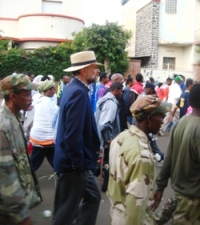Sakanab.co.uk
From the United Kingdom is an Arabic language site that covers Beja events in Sudan with details and photos of events that are quite current. Very basic design. The first Beja newspaper. They've been on the net for a long time.http://sakanab.co.uk/
In English.
Sudannile.com
This site offers general Sudanese news, with an emphasis on politics, and a section for sports and articles by bloggers. Links. This site is written in Arabic. You'll have to dig around to find Beja specific items.www.sudannile.com
Translated by google, into English.
East Democratic Party
The political party offers a plan for introducing change into the way Sudan is governed. A very basic platform is offered, along with an essay by a South African about the difficult situation in East Sudan [English pdf]. News items are available, but the volume of posts ranges from one post per month to fifty per month. In Arabic.
http://edp.jigsy.com/
Translated by google, into English
Beja Congress
The Beja Congress has not managed their web presence very well. An older website was allowed to expire, and the Congress relaunched with a new address in September 2011.
The new website offers a few news items each month, but they are all on a large single page, so translation of the site into English is not possible directly. You have to cut and paste portions of the page to read the news. Other pages - development projects, about the party, are available [translated into English]. The site is in Arabic.
http://bejacongress.net/
Cut a portion of the news from the Arabic site and paste it here: http://translate.google.com/ Get it translated into English for free.
Alrakoba.net
Wide selection of information and news about Sudan. Sudanese news updated round the clock Political articles/ music/ video/ Discussion forums. In Arabic.
http://www.alrakoba.net/
Translated by google, in English
SudaneseOnline.com
This is a very active site! Covers both regular news, political party and community associations press releases and hosts a very active community in its forums. The English pages are out of date.
SudaneseOnline.com in Arabic.
The website as a whole, translated into English.
hedbandbija.wordpress.com/
Inside reports, articles and press releases from various Beja groups calling for dignity and recognition of Beja people. Political. Worth a look. In Arabic.
Translated into English...
www.kassala-asc.com/
A forum with some activity everyday. Created by Kassala expatriates living in Doha, Qatar. (Who knew?) Active Islamic threads, a photo thread, political threads, and many other discussion topics.
In Arabic.
Translated into English.
portsudanonline.com/
A city based blog website with news posted every few days. Nice blog design. Read it in Arabic.
Or read it in English.
http://www.skyscrapercity.com/
On the forums, there are lots of posts for most countries of the world- this is a huge site!. But you can explore Sudan - general discussion, politics, culture, South Sudan, women. In addition, there are lots of photos of buildings under construction and the landscapes of Port Sudan, Kassala, Khartoum Suakin, and Arkowit. In English.
General Sudan page. Or visit the projects and construction, or photography forums.
http://www.skyscrapercity.com/forumdisplay.php?f=2204
alsahafa.sd/
A newcomer on the internet, alsahafa has a few articles exploring the history of the eastern region of Sudan. It also keeps up with news and sports.
In Arabic.
Google offers a free 'alert' service. When it finds your key words or search terms, an email will be sent to you, telling you about the website that has used them. So you might enter "Beja" and "Egypt" or "Port Sudan" as search terms. Build your own email news service here.
http://www.google.com/alerts?hl=en
toomha.com/
A great Beja news website!! Too bad it is no longer being updated. A few items from July and August 2011 are online.
http://toomha.com/
Translated into English.
adroub.blogspot.com
And of course, there's this site here and now. Thanks for visiting. Why not bookmark us inyour favourites? You are on adroub.blogspot.com
There are some facebook pages too, but we'll cover them in another post.




































